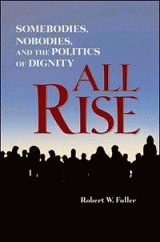This is the twelfth part of the serialization of All Rise: Somebodies, Nobodies, and the Politics of Dignity (Berrett-Koehler, 2006). The ideas in this book are further developed in my recent novel The Rowan Tree.
CHAPTER 11: RELIGION IN A DIGNITARIAN WORLD
If there is no God,
Not everything is permitted to Man.
He is still his brother's keeper
And he is not permitted to sadden
his brother,
By saying that there is no God.
--Czeslaw Milosz, Polish Nobel laureate in literatureThis century will be defined by a debate that
The eye with which I see God is the same eye with which God sees me.
will run through the remainder of its decades:
religion versus science. Religion will lose.
--John McLaughlin, American talk show host
--Meister Eckhart, thirteenth-century German mystic
Religion is at once humanity's consolation and its divider. As individuals, we turn to religion for solace. The concept of the soul invests our existence with a kind of transcendence and helps us cope with the harsh reality that, as Thomas Hobbes famously wrote, life is often "nasty, brutish, and short." The idea of God not only serves as a repository for all we do not yet understand--and there will always be plenty of that--but also provides us with a certain dignity. For that reason alone, religion cannot be omitted in discussing a dignitarian world.
Religion: Dignifier of Humankind
Religions the world over teach the sanctity of human dignity. Theistic religions go further and proclaim the existence of a personal, caring God. Given the supreme importance of dignity and our own spotty record when it comes to according it to each other, it's the rare person who, when all worldly options seemed exhausted, has not wished for divine intervention. In extremis, even skeptics are apt to question, if not suspend, their disbelief. Under dire circumstances, they, too, are prone to hope, if not pray, for some sort of suprahuman or supernatural source of respect. As the "dignifier of last resort," God comforts us through all the stages on life's way.
But despite, or perhaps because of, its place of privilege in the human heart, religion has also been the root of much conflict. It has divided individuals, groups, and entire cultures one from another, and has been invoked as a rationale for violence and war.
These diametrically opposed uses of religion--to confirm the dignity of those who share the faith while sanctioning indignity toward people of a different faith or no faith at all--have led to a polarization of attitudes regarding its role in society. Its potential to trigger debate and sow discord--not only between religion and science but more significantly among the various religions--has a long history that continues into the present. Some observers are even warning that religious conflict may escalate into a "clash of civilizations."
It is impossible to picture a dignitarian world in which these divisive struggles are not resolved. The model-building perspective illuminates the complementarities of the conservative and progressive positions in politics. On the international front, it suggests a better game than war. How might it help assuage the contentiousness that has for so long been associated with religion?
Religion and Science
In previous chapters I've used quotations as pithy summaries of complex ideas. The McLaughlin epigraph at the head of this chapter serves a different purpose. Like much punditry, it's a provocation. Sorting out what's right and what's wrong about the prediction of this onetime Jesuit priest will help us identify the vital role that religion has to play in a dignitarian society.
When religion embraces a particular nature model, it usually does so fixedly. As a consequence, when science moves on to a new model, as it invariably does, religion is left advocating outdated beliefs. That's the position in which the Catholic Church found itself in 1600 in defending Ptolemy's earth-centered model of the solar system against the sun-centered Copernican one. It's the situation in which supporters of creationism--and its offspring, intelligent design--find themselves today.
Religion is not likely to win an argument with contemporary science by championing an earlier science model. Many religious leaders know this and cheerfully cede the business of modeling nature to scientists. Neither they nor the scientists who study these matters, many of whom are themselves people of faith, see any contradiction between the perennial wisdom embodied in the world's religions and, say, Darwin's theory of evolution, the geological theory of plate tectonics, or the Big Bang theory of the cosmos. For example, Tenzin Gyatso, the Dalai Lama, wrote in an op-ed piece in the New York Times, "If science proves some belief of Buddhism wrong, then Buddhism will have to change."
That any of the scientific theories mentioned just above could, in principle, be incorrect or incomplete is taken for granted by the scientific world even though, as of today, there is no evidence that contradicts them unambiguously. Darwin's theory of evolution, Newton's laws of motion, and quantum theory are, of course, "just theories."But each of them is an extremely useful and accurate one. Applied within their domains of validity, they all work well. No society can fully avail itself of modern technology without the guidance provided by these models.
As long as religion doesn't take positions on nature models, it can avoid ending up stranded with a set of obsolete convictions, and find itself defending an old nature model against a new, improved one. If that's what McLaughlin meant, he's right, but he isn't telling us anything Galileo didn't know.
Religion and Values
(Note: You can view every article as one long page if you sign up as an Advocate Member, or higher).





